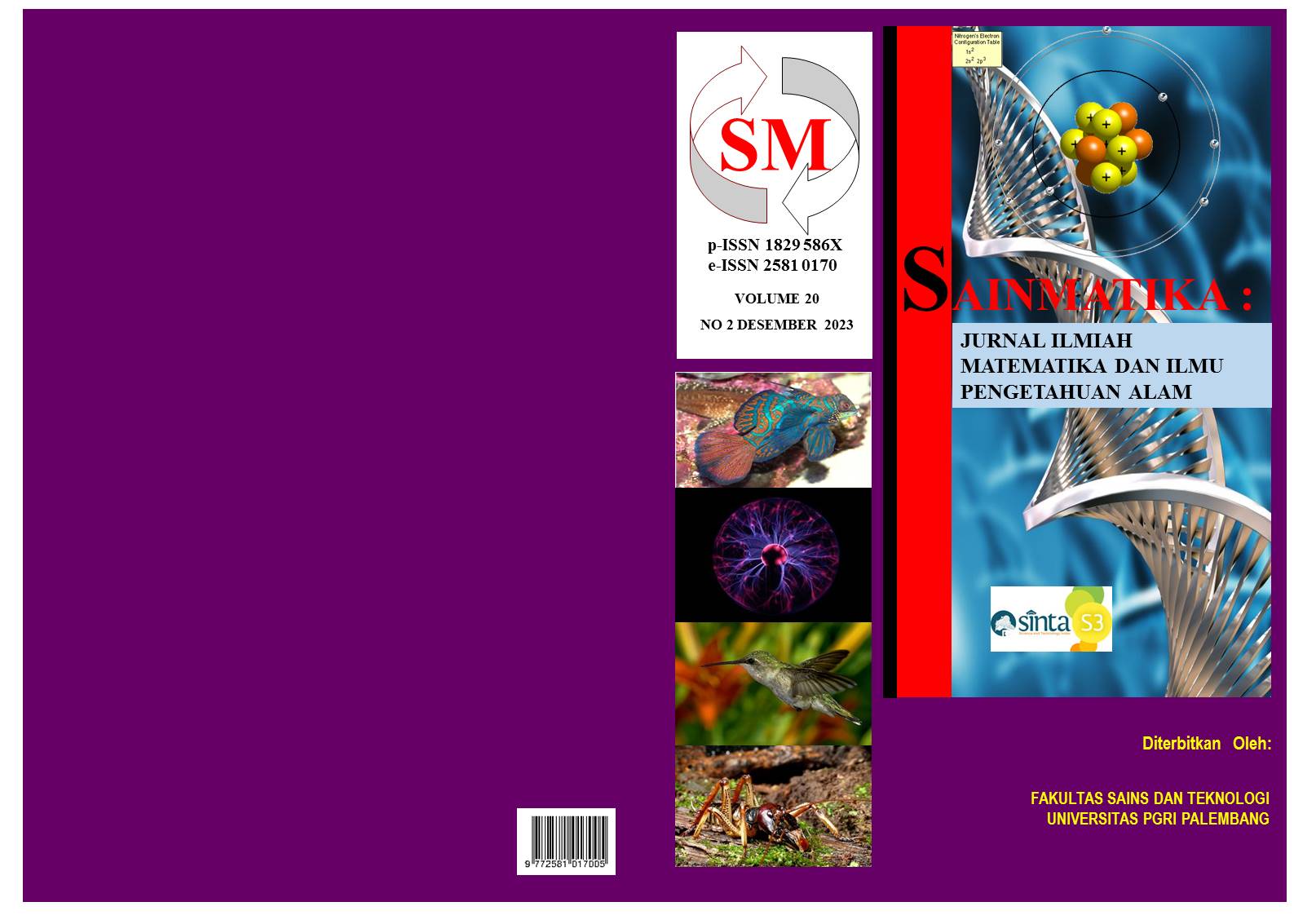Antioxidant Activity of Endophytic Fungi Extract Isolated from Peel of Pineapple (Ananas comosus (L.) Merr. ‘Prabumulih’))
DOI:
https://doi.org/10.31851/sainmatika.v20i2.13270Keywords:
Ananas comosus, Antioxidant, Endophytic Fungi, Pinneapple PeelAbstract
Pineapple (Ananas comosus (L.) Merr. 'Prabumulih') is a tropical fruit that is very popular for its unique aroma and sweet taste. It is also commonly believed that this fruit has potential applications in traditional medicine. However, the peel is not fully harnessed, despite its rich and intricate composition. This study presented findings regarding the endophytic fungi discovered within the peel of A comosus (L.) Merr. 'Prabumulih' and their performance as antioxidants. The endophytic fungal species were identified based on their morphological characteristics. The antioxidant assessment was carried out using the DPPH method. According to the findings of morphological identification, Trichoderma harzianum, an endophytic fungus, was found to exhibit the highest potential as an antioxidant source. Antioxidant activity showed a very strong category (IC50 = 18.74 µg/mL). Through the isolation of its pure constituents and subsequent in vivo testing, there is the potential for this extract from the endophytic fungus to evolve into an innovative source of antioxidants.
References
Abbas, S., Shanbhag, T., & Kothare, A. (2021). Applications of bromelain from pineapple waste towards acne. Saudi Journal of Biological Sciences, 28(1), 1001–1009. https://doi.org/10.1016/j.sjbs.2020.11.032
Adamczak, A., Ożarowski, M., & Karpiński, T. M. (2020). Antibacterial activity of some flavonoids and organic acids widely distributed in plants. Journal of Clinical Medicine, 9(1). https://doi.org/10.3390/jcm9010109
Agrawal, P., Nikhade, P., Patel, A., Mankar, N., & Sedani, S. (2022). Bromelain: A Potent Phytomedicine. Cureus, 14(8), 1–7. https://doi.org/10.7759/cureus.27876
Alam, B., Lǐ, J., Gě, Q., Khan, M. A., Gōng, J., Mehmood, S., Yuán, Y., & Gǒng, W. (2021). Endophytic Fungi: From Symbiosis to Secondary Metabolite Communications or Vice Versa? Frontiers in Plant Science, 12(December), 1–24. https://doi.org/10.3389/fpls.2021.791033
AlMousa, L. A., AlFaris, N. A., Alshammari, G. M., ALTamimi, J. Z., Alsyadi, M. M., Alagal, R. I., & Abdo Yahya, M. (2022). Antioxidant and antimicrobial potential of two extracts from Capparis spinosa L. and Rumex nervosus and molecular docking investigation of selected major compounds. Saudi Journal of Biological Sciences, 29(8), 103346. https://doi.org/10.1016/j.sjbs.2022.103346
Almustafa, H. I., & Yehia, R. S. (2023). Antioxidant, Cytotoxic, and DNA Damage Protection Activities of Endophytic Fungus Pestalotiopsis neglecta Isolated from Ziziphus spina-christi Medicinal Plant. Microorganisms, 11(1). https://doi.org/10.3390/microorganisms11010117
Andonova, T., Muhovski, Y., Slavov, I., Vrancheva, R., Georgiev, V., Apostolova, E., Naimov, S., Mladenov, R., Pavlov, A., & Dimitrova-Dyulgerova, I. (2023). Phenolic Profile, Antioxidant and DNA-Protective Capacity, and Microscopic Characters of Ailanthus altissima Aerial Substances. Plants, 12(4). https://doi.org/10.3390/plants12040920
Bertoni, B., Using, P., Tapwal, A., Yadav, R., & Mohan, S. (2023). Endophytic Fungi Fusarium fujikuroi. 1–19.
Beutel, M. W., Harmon, T. C., Novotny, T. E., Mock, J., Gilmore, M. E., Hart, S. C., Traina, S., Duttagupta, S., Brooks, A., Jerde, C. L., Hoh, E., Van De Werfhorst, L. C., Butsic, V., Wartenberg, A. C., & Holden, P. A. (2021). A review of environmental pollution from the use and disposal of cigarettes and electronic cigarettes: Contaminants, sources, and impacts. Sustainability (Switzerland), 13(23), 1–25. https://doi.org/10.3390/su132312994
Burel, C., Kala, A., & Purevdorj-Gage, L. (2021). Impact of pH on citric acid antimicrobial activity against Gram-negative bacteria. Letters in Applied Microbiology, 72(3), 332–340. https://doi.org/10.1111/lam.13420
Bustamante, M. Á., Michelozzi, M., Caracciolo, A. B., Grenni, P., Verbokkem, J., Geerdink, P., Safi, C., & Nogues, I. (2020). Effects of soil fertilization on terpenoids and other carbon-based secondary metabolites in rosmarinus officinalis plants: A comparative study. Plants, 9(7), 1–19. https://doi.org/10.3390/plants9070830
Carr, A. C., & Maggini, S. (2017). Vitamin C and immune function. Nutrients, 9(11), 1–25. https://doi.org/10.3390/nu9111211
Caruso, G., Abdelhamid, M. T., Kalisz, A., & Sekara, A. (2020). Linking endophytic fungi to medicinal plants therapeutic activity. A case study on asteraceae. Agriculture (Switzerland), 10(7), 1–23. https://doi.org/10.3390/agriculture10070286
Chakraborty, A. J., Mitra, S., Tallei, T. E., Tareq, A. M., Nainu, F., Cicia, D., Dhama, K., Emran, T. Bin, Simal-Gandara, J., & Capasso, R. (2021). Bromelain a potential bioactive compound: A comprehensive overview from a pharmacological perspective. Life, 11(4), 1–26. https://doi.org/10.3390/life11040317
El-Komy, M. H., Saleh, A. A., Eranthodi, A., & Molan, Y. Y. (2015). Characterization of novel trichoderma asperellum isolates to select effective biocontrol agents against tomato fusarium wilt. Plant Pathology Journal, 31(1), 50–60. https://doi.org/10.5423/PPJ.OA.09.2014.0087
Elfita, Muharni, Munawar, & Aryani, S. (2012). Secondary metabolite from endophytic fungi aspergillus niger of the stem bark of kandis gajah (Garcinia griffithii). Indonesian Journal of Chemistry, 12(2), 195–200. https://doi.org/10.22146/ijc.21363
Elfita, Oktiansyah, R., Mardiyanto, Widjajanti, H., & Setiawan, A. (2022). Antibacterial and antioxidant activity of endophytic fungi isolated from Peronema canescens leaves. Biodiversitas, 23(9), 4783–4792. https://doi.org/10.13057/biodiv/d230946
Galindo-Solís, J. M., & Fernández, F. J. (2022). Endophytic Fungal Terpenoids: Natural Role and Bioactivities. Microorganisms, 10(2), 1–22. https://doi.org/10.3390/microorganisms10020339
Gfeller, V., Waelchli, J., Pfister, S., Deslandes-Hérold, G., Mascher, F., Glauser, G., Aeby, Y., Mestrot, A., Robert, C. A. M., Schlaeppi, K., & Erb, M. (2023). Plant secondary metabolite-dependent plant-soil feedbacks can improve crop yield in the field. ELife, 12, 1–20. https://doi.org/10.7554/eLife.84988
Guo, R., Li, G., Zhang, Z., & Peng, X. (2022). Structures and Biological Activities of Secondary Metabolites from Trichoderma harzianum. Marine Drugs, 20(11). https://doi.org/10.3390/md20110701
Hapida, Y., Elfita, Widjajanti, H., & Salni. (2021). Biodiversity and antibacterial activity of endophytic fungi isolated from jambu bol (Syzygium malaccense). Biodiversitas, 22(12), 5668–5677. https://doi.org/10.13057/biodiv/d221253
Jha, P., Kaur, T., Chhabra, I., Panja, A., Paul, S., Kumar, V., & Malik, T. (2023). Endophytic fungi: hidden treasure chest of antimicrobial metabolites interrelationship of endophytes and metabolites. Frontiers in Microbiology, 14(July), 1–16. https://doi.org/10.3389/fmicb.2023.1227830
Jurić, S., Sopko Stracenski, K., Król-Kilińska, Ż., Žutić, I., Uher, S. F., Đermić, E., Topolovec-Pintarić, S., & Vinceković, M. (2020). The enhancement of plant secondary metabolites content in Lactuca sativa L. by encapsulated bioactive agents. Scientific Reports, 10(1), 1–12. https://doi.org/10.1038/s41598-020-60690-3
Khan, R. A. A., Najeeb, S., Hussain, S., Xie, B., & Li, Y. (2020). Bioactive secondary metabolites from Trichoderma spp. Against phytopathogenic fungi. Microorganisms, 8(6), 1–22. https://doi.org/10.3390/microorganisms8060817
Lahlali, R., Ezrari, S., Radouane, N., Kenfaoui, J., Esmaeel, Q., El Hamss, H., Belabess, Z., & Barka, E. A. (2022). Biological Control of Plant Pathogens: A Global Perspective. In Microorganisms (Vol. 10, Issue 3). https://doi.org/10.3390/microorganisms10030596
Lakhdari, W., Benyahia, I., Bouhenna, M. M., Bendif, H., Khelafi, H., Bachir, H., Ladjal, A., Hammi, H., Mouhoubi, D., Khelil, H., Alomar, T. S., AlMasoud, N., Boufafa, N., Boufahja, F., & Dehliz, A. (2023). Exploration and Evaluation of Secondary Metabolites from Trichoderma harzianum: GC-MS Analysis, Phytochemical Profiling, Antifungal and Antioxidant Activity Assessment. Molecules, 28(13), 5025. https://doi.org/10.3390/molecules28135025
Madrid, A., Espinoza, L., Pavéz, C., Carrasco, H., & Hidalgo, M. E. (2014). Antioxidant and toxicity activity in vitro of twelve safrole derivatives. Journal of the Chilean Chemical Society, 59(3), 2598–2601. https://doi.org/10.4067/S0717-97072014000300015
Mohd Ali, M., Hashim, N., Abd Aziz, S., & Lasekan, O. (2020). Pineapple (Ananas comosus): A comprehensive review of nutritional values, volatile compounds, health benefits, and potential food products. Food Research International, 137(April), 109675. https://doi.org/10.1016/j.foodres.2020.109675
Nandi, A., Yan, L. J., Jana, C. K., & Das, N. (2019). Role of catalase in oxidative stress-and age-associated degenerative diseases. Oxidative medicine and cellular longevity, 2019.. Oxidative Medicine and Cellular Longevity, 2019, 1–19.
Nwozo, O. S., Effiong, E. M., Aja, P. M., & Awuchi, C. G. (2023). Antioxidant, phytochemical, and therapeutic properties of medicinal plants: a review. International Journal of Food Properties, 26(1), 359–388. https://doi.org/10.1080/10942912.2022.2157425
Oktiansyah, R., Elfita, E., Widjajanti, H., Setiawan, A., Hariani, P. L., & Hidayati, N. (2023). Endophytic fungi isolated from the root bark of sungkai ( Peronema canescens ) as Anti-bacterial and antioxidant. Journal of Medical Pharmaceutical and Allied Sciences, 12(2320), 8–15. https://doi.org/10.55522/jmpas.V12I2.4925
Oktiansyah, R., Elfita, E., Widjajanti, H., Setiawan, A., Mardiyanto, M., & Nasution, S. S. A. (2023). Antioxidant and Antibacterial Activity of Endophytic Fungi Isolated from The Leaves of Sungkai (Peronema canescens). Tropical Journal of Natural Product Research, 7(3), 2596–2604. https://doi.org/http://www.doi.org/10.26538/tjnpr/v7i3.20
Oktiansyah, R., Widjajanti, H., Setiawan, A., Nasution, S. Sa. A., Mardiyanto, M., & Elfita. (2023). Antibacterial and Antioxidant Activity of Endophytic Fungi Extract Isolated from Leaves of Sungkai (Peronema canescens). Science and Technology Indonesia, 8(2), 170–177. https://doi.org/https://doi.org/10.26554/sti.2023.8.2.170-177 1.
Olech, M., Pietrzak, W., & Nowak, R. (2020). Characterization of free and bound phenolic acids and flavonoid aglycones in Rosa rugosa Thunb. leaves and achenes using LC-ESI-MS/MS-MRM methods. Molecules, 25(8). https://doi.org/10.3390/molecules25081804
Olszowy-Tomczyk, M., & Wianowska, D. (2023). A Concise Profile of Gallic Acid—From Its Natural Sources through Biological Properties and Chemical Methods of Determination. Molecules, 28(3), 1186. https://doi.org/10.3390/molecules28031186
Palimariciuc, M., Balmus, I. M., Gireadă, B., Ciobica, A., Chiriță, R., Iordache, A. C., Apostu, M., & Dobrin, R. P. (2023). The Quest for Neurodegenerative Disease Treatment—Focusing on Alzheimer’s Disease Personalised Diets. Current Issues in Molecular Biology, 45(2), 1519–1535. https://doi.org/10.3390/cimb45020098
Qaderi, M. M., Martel, A. B., & Strugnell, C. A. (2023). Environmental Factors Regulate Plant Secondary Metabolites. Plants, 12(3), 1–27. https://doi.org/10.3390/plants12030447
Radi, R. (2018). Oxygen radicals, nitric oxide, and peroxynitrite: Redox pathways in molecular medicine. Proceedings of the National Academy of Sciences of the United States of America, 115(23), 5839–5848. https://doi.org/10.1073/pnas.1804932115
Rahaman, M. M., Hossain, R., Herrera-Bravo, J., Islam, M. T., Atolani, O., Adeyemi, O. S., Owolodun, O. A., Kambizi, L., Daştan, S. D., Calina, D., & Sharifi-Rad, J. (2023). Natural antioxidants from some fruits, seeds, foods, natural products, and associated health benefits: An update. Food Science and Nutrition, December 2022, 1657–1670. https://doi.org/10.1002/fsn3.3217
Rai, N., Kumari Keshri, P., Verma, A., Kamble, S. C., Mishra, P., Barik, S., Kumar Singh, S., & Gautam, V. (2021). Plant associated fungal endophytes as a source of natural bioactive compounds. Mycology, 00(00), 1–21. https://doi.org/10.1080/21501203.2020.1870579
Raza, A., Razzaq, A., Mehmood, S. S., Zou, X., Zhang, X., Lv, Y., & Xu, J. (2019). Impact of climate change on crops adaptation and strategies to tackle its outcome: A review. Plants, 8(2). https://doi.org/10.3390/plants8020034
Redkar, A., Sabale, M., Zuccaro, A., & Di Pietro, A. (2022). Determinants of endophytic and pathogenic lifestyle in root colonizing fungi. Current Opinion in Plant Biology, 67, 102226. https://doi.org/10.1016/j.pbi.2022.102226
Santos, T. F. B., dos Santos Carvalho, C., de Almeida, M. A., Delforno, T. P., & Duarte, I. C. S. (2020). Endophytic fungi isolated from Brazilian medicinal plants as potential producers of antioxidants and their relations with anti-inflammatory activity. 3 Biotech, 10(5), 1–8. https://doi.org/10.1007/s13205-020-02211-7
Sharifi-Rad, M., Anil Kumar, N. V., Zucca, P., Varoni, E. M., Dini, L., Panzarini, E., Rajkovic, J., Tsouh Fokou, P. V., Azzini, E., Peluso, I., Prakash Mishra, A., Nigam, M., El Rayess, Y., Beyrouthy, M. El, Polito, L., Iriti, M., Martins, N., Martorell, M., Docea, A. O., … Sharifi-Rad, J. (2020). Lifestyle, Oxidative Stress, and Antioxidants: Back and Forth in the Pathophysiology of Chronic Diseases. Frontiers in Physiology, 11(July), 1–21. https://doi.org/10.3389/fphys.2020.00694
Sharma, H., Rai, A. K., Dahiya, D., Chettri, R., & Nigam, P. S. (2021). Exploring endophytes for in vitro synthesis of bioactive compounds similar to metabolites produced in vivo by host plants. AIMS Microbiology, 7(2), 175–199. https://doi.org/10.3934/MICROBIOL.2021012
Shen, N., Chen, Z., Cheng, G., Lin, W., Qin, Y., Xiao, Y., Chen, H., Tang, Z., Li, Q., Yuan, M., & Bu, T. (2023). Diversity, chemical constituents and biological activities of endophytic fungi from Alisma orientale (Sam.) Juzep. Frontiers in Microbiology, 14(June), 1–16. https://doi.org/10.3389/fmicb.2023.1190624
Singh, A. K., Kim, J. Y., & Lee, Y. S. (2022). Phenolic Compounds in Active Packaging and Edible Films/Coatings: Natural Bioactive Molecules and Novel Packaging Ingredients. Molecules, 27(21). https://doi.org/10.3390/molecules27217513
Singh, A., Singh, D. K., Kharwar, R. N., & Gond, S. (2021). Fungal Endophytes as Efficient Sources of Plant-Derived Bioactive Fungal Endophytes as Efficient Sources of Plant-Derived Bioactive Compounds and Their Prospective Applications in Natural Product Drug Discovery : Insights , Avenues , and Challenges. March. https://doi.org/10.3390/microorganisms9010197
Skroza, D., Šimat, V., Vrdoljak, L., Jolić, N., Skelin, A., Čagalj, M., Frleta, R., & Generalić Mekinić, I. (2022). Investigation of Antioxidant Synergisms and Antagonisms among Phenolic Acids in the Model Matrices Using FRAP and ORAC Methods. Antioxidants, 11(9). https://doi.org/10.3390/antiox11091784
Stuper-Szablewska, K., Szablewski, T., Przybylska-Balcerek, A., Szwajkowska-Michałek, L., Krzyżaniak, M., Świerk, D., Cegielska-Radziejewska, R., & Krejpcio, Z. (2023). Antimicrobial Activities Evaluation and Phytochemical Screening of Some Selected Plant Materials Used in Traditional Medicine. Molecules, 28(1), 1–20. https://doi.org/10.3390/molecules28010244
Syarifah, Elfita, Widjajanti, H., Setiawan, A., & Kurniawati, A. R. (2021). Diversity of endophytic fungi from the root bark of Syzygium zeylanicum, and the antibacterial activity of fungal extracts, and secondary metabolite. Biodiversitas, 22(10), 4572–4582. https://doi.org/10.13057/biodiv/d221051
Tang, W., Li, W., Yang, Y., Lin, X., Wang, L., Li, C., & Yang, R. (2021). Phenolic compounds profile and antioxidant capacity of pitahaya fruit peel from two red-skinned species (Hylocereus polyrhizus and hylocereus undatus). Foods, 10(6). https://doi.org/10.3390/foods10061183
Varilla, C., Marcone, M., Paiva, L., & Baptista, J. (2021). Bromelain, a group of pineapple proteolytic complex enzymes (Ananas comosus) and their possible therapeutic and clinical effects. a summary. Foods, 10(10). https://doi.org/10.3390/foods10102249
Verma, A., Gupta, P., Rai, N., Tiwari, R. K., Kumar, A., Salvi, P., Kamble, S. C., Singh, S. K., & Gautam, V. (2022). Assessment of Biological Activities of Fungal Endophytes Derived Bioactive Compounds Isolated from Amoora rohituka. Journal of Fungi, 8(3). https://doi.org/10.3390/jof8030285
Vigneshwari, A., Rakk, D., Németh, A., Kocsubé, S., Kiss, N., Csupor, D., Papp, T., Škrbić, B., Vágvölgyi, C., & Szekeres, A. (2019). Host metabolite producing endophytic fungi isolated from Hypericum perforatum. PLoS ONE, 14(5), 1–16. https://doi.org/10.1371/journal.pone.0217060
Walsh, T. J., Hayden, R. T., & Larone, D. H. (2018). Larone’s Medically Important Fungi. In Larone’s Medically Important Fungi. https://doi.org/10.1128/9781555819880
Wang, H., Liu, Z., Duan, F., Chen, Y., Qiu, K., Xiong, Q., Lin, H., Zhang, J., & Tan, H. (2023). Isolation, identification, and antibacterial evaluation of endophytic fungi from Gannan navel orange. Frontiers in Microbiology, 14. https://doi.org/10.3389/fmicb.2023.1172629
Watanabe, T. (2010). Pictorial Atlas of Soil and Seed Fungi. In Pictorial Atlas of Soil and Seed Fungi. https://doi.org/10.1201/ebk1439804193
Wen, J., Okyere, S. K., Wang, S., Wang, J., Xie, L., Ran, Y., & Hu, Y. (2022). Endophytic Fungi: An Effective Alternative Source of Plant‐Derived Bioactive Compounds for Pharmacological Studies. Journal of Fungi, 8(2). https://doi.org/10.3390/jof8020205
Wijekoon, C., Netticadan, T., Sabra, A., Yu, L., Kodikara, C., & Badea, A. (2022). Barley Cultivars and Elite Germplasm.
Yang, L., Wen, K. S., Ruan, X., Zhao, Y. X., Wei, F., & Wang, Q. (2018). Response of plant secondary metabolites to environmental factors. Molecules, 23(4), 1–26. https://doi.org/10.3390/molecules23040762
Zdrojewicz, Z., Chorbińska, J., Biezyński, B., & Krajewski, P. (2018). Health-promoting properties of pineapple. Pediatria i Medycyna Rodzinna, 14(2), 133–142. https://doi.org/10.15557/PiMR.2018.0013
Zeng, Y., Zhou, W., Yu, J., Zhao, L., Wang, K., Hu, Z., & Liu, X. (2023). By-Products of Fruit and Vegetables: Antioxidant Properties of Extractable and Non-Extractable Phenolic Compounds. Antioxidants, 12(2), 1–26. https://doi.org/10.3390/antiox12020418

Downloads
Published
Issue
Section
License

This work is licensed under a Creative Commons Attribution-NonCommercial-ShareAlike 4.0 International License.








